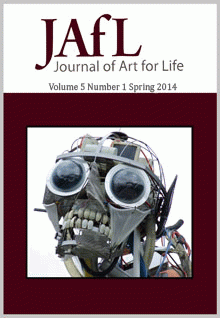Fragments of what? Postmodernism, Hybridity and Collage
Keywords:
art education, postmodernism, identity, hybridity, transculturalAbstract
This paper argues that unresolved issues about identity affecting art historical and art education theory-practice are traceable to modernism’s anxiety about hybridity’s imagined threat to cultural purity and integrity. Postmodernism’s solution to modernist anxiety involved showing the fallacy of deriving identity from essences and exposing identity’s socially constructed origins. This advanced recognition of cultural plurality and relativity, but cast identity’s integrity as the effect of cultural imagination projected onto autonomous fragments. Fragments, however, presuppose wholes. A picture of integrated interrelated dynamic wholes is retrieved by reconceiving the concepts of hybridity and collage outside the dualistic frames of modernism and postmodernism. Reconceived in metonymic terms as constituted of presence and absence, and repositioned within the dialectic of the context-sensitive and context-free tendencies of culture, art pedagogy is established on a foundation that predisposes practice to recognize cultural difference and integrity, in and through transcultural similarities, dynamic agency and interdependence.Downloads
Published
2014-03-15
Issue
Section
Articles
License
Authors who publish with this journal agree to the following terms:- Authors retain copyright and grant the journal right of first publication with the work simultaneously licensed under a Creative Commons Attribution License that allows others to share the work with an acknowledgement of the work's authorship and initial publication in this journal.
- Authors are able to enter into separate, additional contractual arrangements for the non-exclusive distribution of the journal's published version of the work (e.g., post it to an institutional repository or publish it in a book), with an acknowledgement of its initial publication in this journal.
- Authors are permitted and encouraged to post their work online (e.g., in institutional repositories or on their website) prior to and during the submission process, as it can lead to productive exchanges, as well as earlier and greater citation of published work (See The Effect of Open Access).


